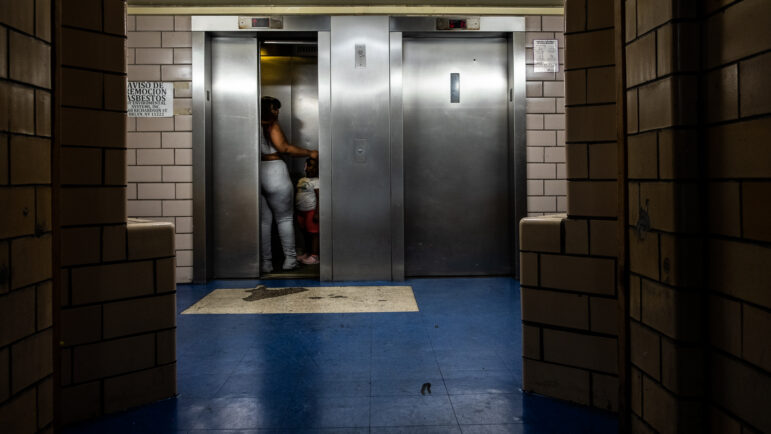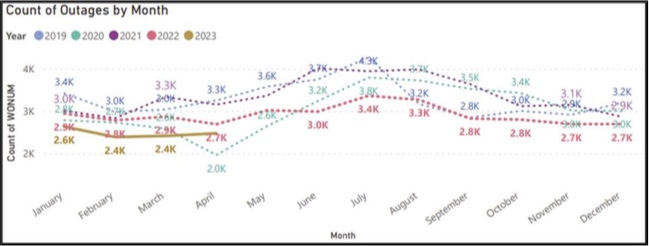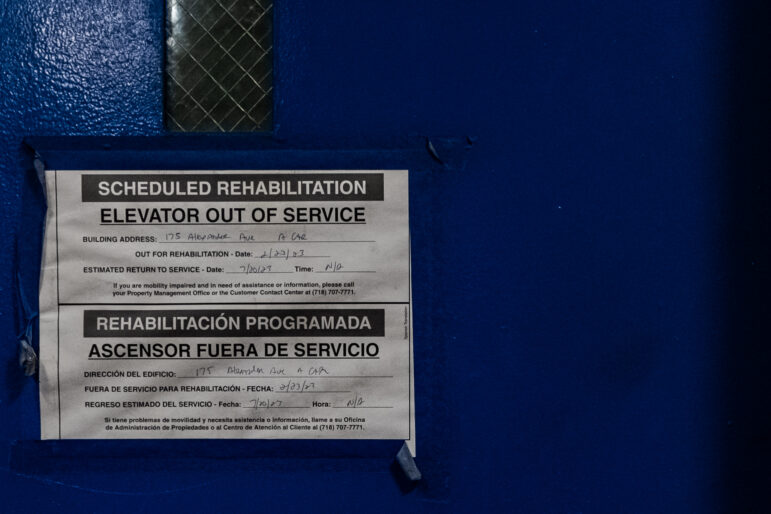While the number of NYCHA campuses that saw elevator outages between January and April of this year was the same as the year before, the total number of incidents—9,904—declined by more than 12 percent, and NYCHA’s response time for repairs improved.

“You’ve got about a 20-minute wait, if you’re lucky,” William Santos, a resident at Mitchel told City Limits.
This year, Mitchel Houses is among the worst performing public housing developments for elevators, with 233 outages so far in the first four months of 2023, according to a May report by Bart Schwartz, NYCHA’s federal monitor. The other two poor-performing campuses are both in East Harlem: at Johnson Houses, with 258 outages, and Wagner Houses with 235 outages as of April.
But tenants at the high-rise campus may get some relief soon, though not as quickly as many would like. NYCHA has several initiatives underway to upgrade elevators across the system, including with funding earmarked through capital improvement projects—under which Mitchel Houses will see all of its approximately 20 campus elevators replaced—along with a separate, $300 million elevator replacement project targeting NYCHA properties with the oldest lifts.
“The pace of replacements is now significantly increasing,” Schwartz said in the report, which noted that while the number of NYCHA campuses that saw elevator outages between January and April of this year was the same as the year before, the total number of incidents—9,904— declined by more than 12 percent, and NYCHA’s response time for repairs improved.

NYCHA Monitor, May 2023 Elevator Report
Elevator outages at NYCHA by month and year.
But for tenants waiting for better service, progress can be slow: elevator work across the campuses selected under the $300 million intiative are estimated to take between 49 to 81 months, depending on the site. Replacements at the Mitchel Houses’ 10 buildings, where the first phase of work started in February, will see five elevators completed between July and September, while the rest won’t be finished until the first quarter of 2024.
In the meantime, while repairs take place in a given building at Mitchel, one elevator must be out of service while the other remains operational, according to NYCHA—leaving residents with unreliable service and forcing them to adapt in getting to and from their homes.

Adi Talwar
People waiting for one functioning elevator at a Mitchel Houses apartment building located at 175 Alexander Avenue, Bronx.
Williams, who has lived at Mitchel Houses for five years, said the elevator does not stop on the seventh floor where he lives. The last time it did, he recalls, was in early April.
“When you have groceries you either have to go to the eighth floor and walk down or go to the sixth floor and walk up,” said Williams.
Living one floor above him is Diaxa Torres, who had to learn a maneuver to get the elevator to stop at her floor. “I have to press eight and nine as one button just to get to my floor,” Torres said. “If I just press eight by itself, it’ll just skip eight.”
If the elevator service is particularly slow, she and her 8-year-old daughter prefer to take the stairs. On days when the elevator is not working at all, she finds herself helping neighbors who struggle walking up or down the stairs by themselves.
“It’s a hassle especially when I have to go food shopping,” Torres said. “It’s supposed to be a community that helps each other, not a place where we’re all struggling.”
John Rodriguez, who lives on the 16th floor at a Mitchel Houses building, said he avoids taking the stairs after he tripped and fell while walking down to the sixth floor landing. But taking the elevator does not make it easier to get to his apartment.
“Yesterday we all got in the elevator, it went up to the fourth floor, the door didn’t open,” Rodrigez said. “It went up the eighth floor, the elevator didn’t open, it went up to the 20th floor and nothing—and then it just went straight down.”
Agnes Toro, a mother of three and soon-to-be grandmother, lives in a three-bedroom apartment with her family on the 16th floor. She is also the caretaker of her 89-year-old mother who lives on the same campus but in a different building.
Despite having only one elevator in service in her building, Toro said she never misses a day seeing her mother, even if that means walking up 18 flights of stairs.
“I have to walk over people sleeping in the staircase,” Toro said. “People let their dogs do their thing in the staircase–pee and everything.”
The climb usually takes more than an hour for Toro, she said.
“I just had a knee operation but I still walk up the stairs and take that chance,” Toro said, adding that her elderly mother is afraid of riding the elevator and will only go outside for doctor appointments—an occurrence that happens roughly once a month. “We can’t take that chance to take her outside.”

Adi Talwar
Agnes Toro, a Mitchel Houses resident recently had knee replacement surgery. When the elevators are not in service it takes her more than an hour to climb up the stairs to the 18th floors to visit her 89-year-old wheelchair bound mother.
More than 78,000 public housing residents in the city are over the age of 62, according to NYCHA. The authority also houses 31,000 residents with mobility impairments. The oldest elevators in NYCHA—of which there are more than 3,000 across 266 developments—are approximately 32 years old.
With summer in full swing, Williams said he is concerned about overcrowded elevators and poor ventilation.
“So if you get stuck in there and the temperature outside is 98 [to] 100 degrees, how would you fare with five or six or seven other people?” Williams asked. “NYCHA better get themselves together because they received a lot of money and they’re making a lot of promises.”
Upgrades to the elevators at Mitchel Houses are being funded with nearly $12 million as part of a “capital revitalization plan” and funding agreement between NYCHA and the Dormitory Authority of the State of New York (DASNY) in 2019. Elevators at nine other NYCHA campuses were included in that initiative, all of which have either reached or surpassed the typical useful life span of 15 to 20 years for an elevator in a multifamily residential property.
In January, as part of a separate effort, Mayor Eric Adams, Gov. Kathy Hochul and NYCHA’s Interim CEO, Lisa Bova-Hiatt announced that 35 elevators across 20 developments will be replaced. The $300 million initiative is part of a partnership between NYCHA and the DASNY that began last April, which also includes six developments for senior citizens. Those updates are slated to be finished by December 2028.
Other, smaller scale elevator projects have taken root over the last several years. In 2021, Boston Road Houses—where a malfunctioning elevator in 2015 killed a senior citizen— received elevator replacements, bringing the number of elevator outages there from 44 in 2021 to just four in 2023, the Monitor report notes.

Adi Talwar
NYCHA’s records indicate that one of the two elevators at 175 Alexander Avenue at the Mitchel Houses has been undergoing repairs since February 2023.Two other developments, Mott Haven and Patterson Houses in the South Bronx, have undergone their own set of elevator improvements. Both campuses were part of a pilot program which ran for approximately nine months at each site between 2021 and 2022, according to NYCHA.
The two sites were selected because of a poor track record of outages and restoration times. In 2021, Patterson Houses saw 1254 outages while Mott Haven Houses saw 883 over the course of a year.
As part of the pilot program, NYCHA created dedicated teams to work on outages and repairs, respectively, to make its “preventative maintenance” efforts more efficient. By the end of the pilot project, NYCHA said it saw a 60 percent reduction in outages. Four sites—Lafayette Gardens, Tilden Houses, Bushwick Houses and Lincoln Houses—have since been added to the initiative.
In an email, NYCHA shared their appreciation for the partnership with the Federal Monitor that placed “strong policies that are demonstrating success.”
“NYCHA remains committed to providing improved elevator service for all residents with emphasis on those with mobility impairments and seniors,” a NYCHA spokesperson wrote. “NYCHA developments have had fewer elevator outages, with shorter outage durations and quicker outage response times.”








